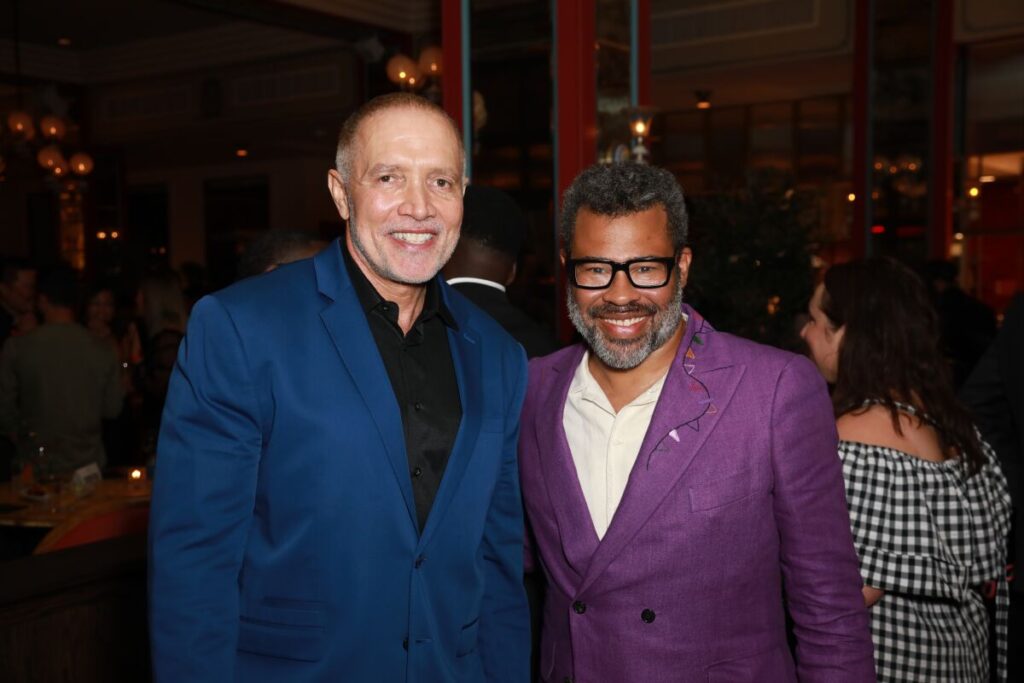When “Get Out” opened in 2017 and lit the fuse on Jordan Peele’s skyrocketing career as a filmmaker, Steven Spielberg told him: “Michael Abels — that guy is great. You’ve got to use him again. It’s like me and John Williams.”
“I’ve been doubling down on that since he said that,” Peele says now.
After (literally) doubling the creep factor in “Us,” with the help of composer Abels, Peele tripled down on the collaboration on “Nope” — a film with Spielbergian tendencies and scale.
“It was clear that when the film finally gets around to becoming an action-adventure, that it needed to deliver that in the full scale,” says Abels. “Just as it’s shot in Imax, it sonically needed to be larger than life, in a way that none of Jordan’s other films have been.”
But the film also brought them full circle to their origin story. Peele first discovered Abels thanks to a concert piece called “Urban Legends” uploaded to YouTube.
“I knew he was capable of creating a chimera effect of music genre,” says Peele, “to take what, to me, sounded like jazz and western score and sweeping Chinese epic — and combine it into this new flavor. That’s what I wanted to do with ‘Get Out’ and ‘Us.’ I wanted a new flavor of film. I wanted a new flavor of thriller.”
“Nope” writer-director Jordan Peele, right, says composer Michael Abels was able to precisely pinpoint moments of “the love, the pace, the thrill, the magic of being a kid again” for the film.
(Kirk McKoy/Alex J.Berliner)
Peele was listening to “Urban Legends” again when he wrote “Nope,” and ended up using the piece while editing a climactic horse ride during the final intergalactic showdown. Abels was surprised at how well the piece, composed in 2010, worked in this completely alien context.
“It sounds like a horse galloping,” Abels says, laughing. “But it’s like a new take on a western. When I understood it from Jordan’s ears, then I realized: This is my connection between the traditional western music and our modern western. And the excitement that the characters feel being chased by something that is planning to eat them, and how they’re risking their lives knowing that that’s what they’re risking, and they’re both terrified and enjoying it — I think the music captures that.”
Abels wrote a family theme for siblings OJ (Daniel Kaluuya) and Emerald (Keke Palmer), which evokes the classic feeling of heartland Americana. He also wrote a hypnotic groove to accompany their preparation of a trap for the predator in the sky — using marimba, mellow piano, glass bottles and other “ear candy.”
One of the film’s central ideas is the concept of a “bad miracle,” and Abels scored that from different angles — both as an abstract idea, but also the protagonist’s slightly giddy excitement about it. He used unnerving orchestral techniques — like having strings or brass play the same note but out of sync with each other — to achieve “a very maintained chaos.”
Abels’ “ability to do the horror part of things, and the anticipatory moments — the moments before something is happening that fill you with dread — is really remarkable,” says Peele. “And yet with this film, it was the elements that are meant to enrapture an audience — the love, the pace, the thrill, the magic of being a kid again and playing out in the backyard with your sibling and feeling like aliens are real… these are all kinds of things that we would discuss, and he would be able to precisely pinpoint these tonalities, these vibes.”
Abels wrote a lot of the film’s source music, from the faux-western score tracks that play in the Jupiter’s Claim theme park to a fast food jingle that didn’t make the final cut. “I really do like writing the music that’s supposed to just be a joke and no one’s supposed to notice,” he said. “It’s a way to tease Jordan or just tell him a joke and make him laugh.”
But “the piece of the puzzle that I think really surprised me,” says Peele, “was how much the warmth, and the sibling love story and the heart of the film needed to translate through his music. That was a very new thing for me. I think my films have a barrier of a bit of a sense of humor or satirical barrier. But the vulnerability of this score, I think, is something that is the most expansive part for my work, and for Michael’s work with me. I was just in love when he started playing for me things that began to make me cry.”
The overall tone of “Nope” was harder for Peele to define than his previous films, but he kept coming back to the idea of a spectrum — “something where you can see the beauty of every part of it, but also together it means something that is even more beautiful and spectacular.”
“I generally think of movies in terms of the bad thing I’m trying to call out in humanity, and that is the exploitation part of the industry,” the director notes. “And I’m also trying to give people an escape, and I’m trying to provide some of the spectacle that I’m condemning [in the film]. When I think of the score, and I think of Michael’s work, I think of honoring this idea of the spectacle and the spectrum.”

